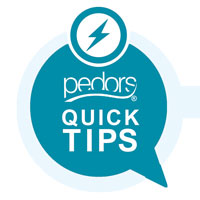Mens Venous Insufficiency Shoes by Pedors

By Stephen O'Hare, President and Co-Founder, Pedors Shoes
For over 25 years Pedors Shoes has designed and manufactured shoes for problem feet. Our goal is to get our customers back on their feet again with affordable, quality footwear that addresses their specific needs. We’re here to help. Your footwear problems are our challenges.
Mens Venous Insufficiency Shoes - A Buyers Guide For Men by Pedors Shoes
Venous insufficiency can affect both men and women, although it is often reported to be more common in women. However, men are certainly susceptible to venous insufficiency, and the condition can occur for various reasons.
Factors That Contribute To Venous Insufficiency In Men
Genetics
Family history plays a significant role in the development of venous insufficiency. If there is a history of venous disorders in the family, both men and women may be at an increased risk.
Age
Venous insufficiency becomes more prevalent with age, and aging can affect the elasticity of blood vessels. Men, especially as they get older, may experience changes in vein function that contribute to the condition.
Occupational Factors
Certain occupations that involve prolonged periods of standing or sitting may contribute to venous insufficiency in men. Jobs that require extended periods of standing, such as those in the healthcare or retail industries, may increase the risk
Obesity
Excess body weight is a risk factor for venous insufficiency. Obesity can put additional pressure on the veins, affecting blood flow and increasing the likelihood of venous issues
Lifestyle Factors
Sedentary lifestyles and lack of regular physical activity can contribute to poor circulation and venous insufficiency. Men who lead predominantly sedentary lives may be at an increased risk.
Smoking
Smoking can have detrimental effects on blood vessels, including the veins. The chemicals in tobacco can contribute to the development and progression o venous insufficiency.
Chronic Health Conditions
Certain chronic health conditions, such as hypertension or diabetes, can affect blood vessel function and contribute to venous insufficiency.
Trauma or Surgery
Trauma or surgeries involving the veins can impact their function, potentially leading to venous insufficiency.
Deep Vein Thrombosis (DVT)
DVT, a condition where blood clots form in the deep veins, can damage the veins and lead to venous insufficiency. Men who have had a history of DVT may be at a higher risk.
While some risk factors for venous insufficiency may be more prevalent in men or women, the condition can affect individuals of any gender. It's important to recognize and address risk factors, and individuals experiencing symptoms such as leg swelling, pain, or changes in skin appearance should seek medical evaluation for proper diagnosis and management. Lifestyle modifications, compression therapy, and medical interventions are among the treatment options available for venous insufficiency.
What are the design features men with venous insufficiency should look for in footwear?
Men with venous insufficiency should consider specific design features in footwear that provide proper support, promote healthy blood circulation, and minimize discomfort associated with this condition. Here are key design features to look for in footwear for men with venous insufficiency:
Compression and Support
Choose shoes that offer gentle compression, especially around the ankle and arch areas. Compression can aid in improving blood circulation. Look for shoes with arch support and a firm heel counter to reduce strain on the veins.
Low Heel Height
Opt for shoes with a low or flat heel. Higher heels can contribute to calf muscle fatigue and may adversely affect blood circulation, potentially worsening venous insufficiency symptoms.
Wide Toe Box
Shoes with a wide toe box provide ample room for the toes, reducing pressure on the front of the foot. This is particularly important for men with bunions, hammertoes, or other toe deformities.
Adjustable Closures
Look for shoes with adjustable closures, such as Velcro straps or laces. This feature allows for a customized and secure fit, accommodating any changes in foot swelling throughout the day.
Cushioning
Seek shoes with sufficient cushioning in the insole and midsole to provide shock absorption. This can be beneficial for minimizing discomfort or pain associated with venous insufficiency.
Lightweight Construction
Lightweight shoes are more comfortable for extended wear, reducing fatigue and making walking easier for men with venous insufficiency.
Breathable Materials
Choose shoes made from breathable materials, such as mesh or leather, to maintain a comfortable temperature and reduce the risk of moisture-related skin issues.
Removable Insoles
Shoes with removable insoles allow for customization with orthotic inserts or additional padding. This feature provides personalized comfort and support based on individual needs.
Non-Slip Outsoles
Prioritize shoes with non-slip or slip-resistant outsoles to enhance stability and reduce the risk of slips and falls, which can be a concern for individuals with compromised circulation.
Diabetic-Friendly Features
Men with venous insufficiency who also have diabetes should consider shoes with diabetic-friendly features, such as extra depth and a seamless interior, to minimize the risk of skin issues.
Room for Swelling
Select shoes that offer some extra room to accommodate potential foot swelling, a common symptom of venous insufficiency.
Stylish Options
Many brands offer stylish and supportive footwear for men. Look for shoes that combine fashion with function, allowing you to maintain a sense of style while prioritizing foot health.
It's crucial for men with venous insufficiency to consult with healthcare professionals, such as a podiatrist or vascular specialist, for personalized advice on footwear. Professional fitting ensures the right size and fit, contributing to overall foot health.
Conclusion on the Pedors Guide to Mens Venous Insufficiency Shoes
If you have any questions please don't hesitate to email us at support@pedors.com or call 1-800-750-6729 if in the USA or +1 770 218 8282 if outside the USA.

